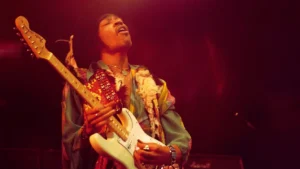“If someone from outer space landed in Britain and was told to consume mainstream media for the next two months, and then explain what it means to be a Black Briton, I don’t think the result would be someone who sounds like me.”
That line, delivered with a wry laugh by Lanre Bakare, speaks volumes. It’s anecdotal, sure, but it carries the weight of something larger—something more systemic. The broad West Yorkshire accent, the cultural references rooted in Bradford, Manchester, Wigan, and Liverpool, the histories passed down not in media headlines but in community centers and smoky clubs and council estate kitchens—all of it too often ignored in the mainstream portrait of Black British identity.
Bakare’s debut book, We Were There, is a direct response to that erasure. It’s not angry, but it’s not soft either. It’s deliberate. Panoramic. Tender. A patchwork of people, places, protests, and cultural peaks that builds a much more complete, messy, and meaningful image of Black Britain—outside the capital.
Not Just London, Not Just Now
If you’ve read a history of Black Britain lately—or watched a TV doc or drama on the subject—chances are it unfolded on a London stage. Brixton, Notting Hill, Lewisham, Tottenham. And rightfully so—these are places that shaped the political and cultural DNA of Black British life.
But Bakare’s question is: What about everywhere else?
“We’re so often told that Black British identity was forged on London’s streets alone,” he says. “But I wanted to look beyond that. I wanted to trace the beats, the resistance, the rhythms in places that are overlooked—even by us.”
Born and raised in Bradford, Bakare is a writer and cultural critic best known for his work at The Guardian, where his 2021 piece on Black youth culture in 1970s Wigan lit the spark for this book. That article, which became the book’s first chapter titled “Northern Souls, 1977”, peeled back the layers on a scene that’s barely remembered outside its own walls—young Black kids with afros and flared trousers breaking through the smoke and sound of northern soul dance floors.
But what began as a music story grew quickly into something bigger.
From Soul Clubs to Statues: Rediscovering Radical Histories
Following that initial spark, Bakare’s research spun into what he calls “a series of beautiful rabbit holes.” He dug into archives, interviewed elders, walked neighborhoods, and uncovered decades of resistance and renaissance across Britain’s northern and midland cities.
One chapter dives into Liverpool’s L8 postcode, home to one of Britain’s oldest Black communities. There, Bakare maps the neighborhood’s legacy of anti-racist activism, culminating in the toppling of a statue of William Huskisson, a Liverpool MP and slave trade apologist. The event happened not in 2020, but decades earlier—long before statue-toppling became shorthand for protest.
Elsewhere, he chronicles the Reno Club in Manchester’s Moss Side, once a heartbeat of Black nightlife in the North. It’s a place that welcomed not only local talent but Muhammad Ali himself, during a visit that remains mythical among those who were there. The club, like many others, has since been demolished—erased from the physical landscape but kept alive through stories, oral histories, and now, Bakare’s writing.
Each chapter in We Were There acts like a geographic memory scan, resurfacing scenes and voices from places like Leeds, Nottingham, Bristol, and of course Bradford—his own starting point. He captures stories of migration, of riots, of music and family, of grief and celebration, spanning from the early 20th century to the late Thatcher years.
Telling the Untold—Without Flattening the Narrative
What makes We Were There compelling is not just its subject matter—it’s how Bakare handles it.
Too often, Black British histories are presented in extremes: victims or revolutionaries, grief or grit. Bakare’s voice resists that flattening. His writing is both investigative and intimate, shifting easily from macro-political analysis to moments of personal connection. He captures the complex humanity of his subjects—their contradictions, their quiet revolutions, their private sorrows.
“It was important to write something that felt lived in,” he says. “Not just as a journalist reporting from the outside, but as someone whose life overlaps with these places, these histories.”
That duality—of observer and participant—infuses the book with a kind of authentic urgency. It’s a work of history, yes, but also a record of cultural presence. It doesn’t romanticize the past, but it doesn’t erase its joy either.
The Politics of Place
One of the book’s most crucial arguments is that geography shapes experience. The way Black Britons experience racism, community, opportunity, and representation varies dramatically based on where they grow up.
“Being Black in London is not the same as being Black in Sheffield,” Bakare says plainly. “In one, there’s a density—more visible community, infrastructure, maybe even recognition. In the other, you can feel like the only one. Or the only one who remembers.”
This theme is particularly sharp in chapters about the 1981 riots, often framed around London’s Brixton uprising. But Bakare draws attention to riots in Leeds (Chapeltown), Liverpool (Toxteth), and Birmingham (Handsworth), where similar triggers—police brutality, economic neglect, systemic racism—ignited protests just as fierce and politically charged.
He connects these uprisings to the present day, underlining the repetition of injustice, but also the repetition of resilience.
Archiving the Unarchived
A major achievement of We Were There is that it functions as a kind of counter-archive. Much of what Bakare writes about wasn’t documented in books, newspapers, or school curriculums. It lived in people’s memories, was passed down in anecdotes, or existed only in photos buried in boxes.
In speaking with elders and local historians, Bakare weaves these informal memories into a collective memory, one that validates the Black British experience beyond the capital. He calls it “giving flowers while people are still here.”
He also spotlights figures who’ve long been overlooked—activists, DJs, club owners, teachers—people whose names aren’t in textbooks but who shaped their communities in profound ways.
We Were There: A Title That’s Both Reminder and Reclamation
The book’s title is deceptively simple. We Were There.
It reads like a whisper. A footnote. But it’s also a declaration. A correction to any version of British history that dares to exclude, minimize, or overlook.
It’s a reminder that Black Britons didn’t just arrive with Windrush. That they weren’t confined to London. That they weren’t waiting in the wings of history—they were front and center, shaping it.
The title says: We were there—when the clubs played soul ‘til 4 a.m.
We were there—when the protests marched through town squares.
We were there—raising families, surviving, creating, resisting, thriving.
Rewriting the Map of Black British History
Lanre Bakare’s We Were There is more than a book. It’s a cultural re-mapping—a shift in perspective that insists Black Britain be seen in its full, decentralized, and richly varied form.
It’s a response to a media landscape that still largely defines Black Britishness through a London-centric lens. It’s a challenge to the narratives that only show resistance or trauma, but forget about joy, friendship, and day-to-day life. And it’s an offering to future generations: a reference point, a blueprint, a reminder.
In many ways, Bakare has created what he felt was missing when he looked around at the culture growing up—a record that sounds like him, that reflects the rhythms of West Yorkshire, the energy of Moss Side, the rebellion of L8, the soul of Wigan.
No comments yet.








